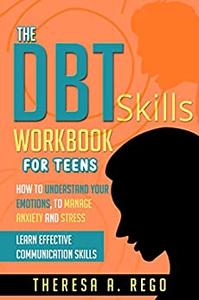
Free Download THE DBT SKILLS WORKBOOK FOR TEENS: How to Understand Your Emotions, to Manage Anxiety and Stress Learn Effective Communication Skills by Theresa A. Rego
English | 2021 | ISBN: N/A | ASIN: B09N9L84QQ | 105 pages | EPUB | 0.16 Mb
Dialectical behavior therapy, or DBT, is an evidence-based form of psychotherapy created by Dr. Marsha Linehan to treat people struggling with emotional regulation.
It was first designed for treating suicidal individuals and patients with a borderline personality disorder to help them learn tools that will allow for more effective coping skills. More recently, it has also been endorsed by the National Institute of Mental Health as an evidence-based treatment for depression in adults.
An emotion regulation skill such as distress tolerance, mindfulness, and emotion regulation (accepting your feelings without judgment) is commonly used to treat Borderline Personality Disorder.
Dialectical Behavior Therapy is the first therapy program to treat suicidal patients with this disorder.
The program focuses on interpersonal effectiveness and emotion regulation, distress tolerance, and mindfulness as well. This therapy program teaches clients how to have effective relationships even when experiencing conflict or disagreement.
This book covers:Basic distress tolerance skillsAdvanced distress tolerance skillsMore distress tolerance skillsBasic mindfulness skillsAdvanced mindfulness skillsExploring mindfulness furtherBasic emotion regulation skillsAdvanced emotion regulation skillsBasic interpersonal effectiveness skillsAdvanced interpersonal effectiveness skillsExposure-based cognitive rehearsalPutting it all togetherDBT is not considered a specific goal-driven endpoint of therapy but rather a process that continues even after formal psychotherapy has ended.
DBT teaches skills to its patients that can be applied to any situation in their lives. Because of this principle, therapy need not always strictly focus on the originating issue. It can encompass many aspects of an individual's life and interactions with others.
Integrative and holistic practices such as yoga and meditation are central to DBT; mindfulness is common in both these activities.
Links are Interchangeable - Single Extraction
